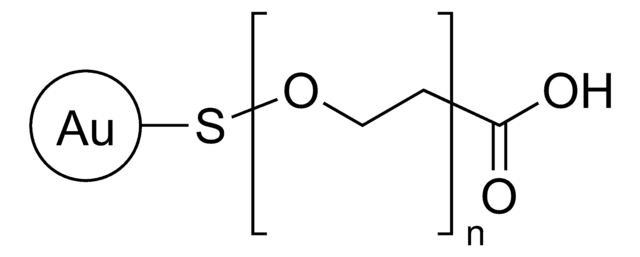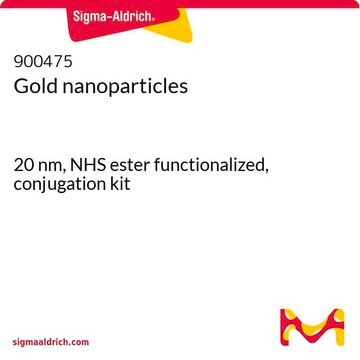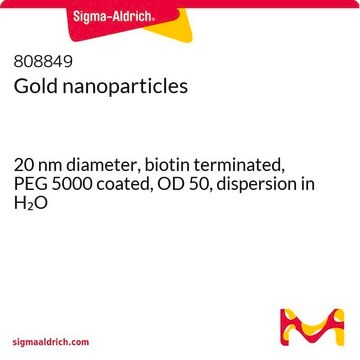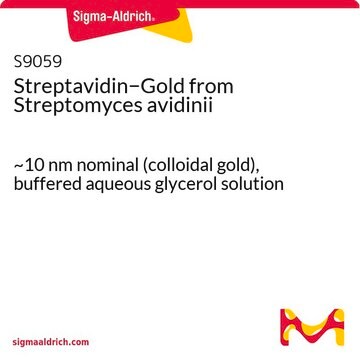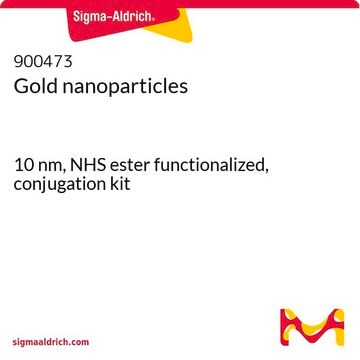808628
Gold nanoparticles
5 nm diameter, biotin terminated, PEG 5000 coated, OD 50, dispersion in H2O
Synonym(s):
Biotin Gold
Sign Into View Organizational & Contract Pricing
All Photos(1)
About This Item
Recommended Products
material
PEG 5000
Quality Level
form
dispersion in H2O
nanoparticles
packaging
pkg of 0.5 mL
OD
50
surface area
6.18 m2/g
diameter
5 nm
pH
5-7
density
1.00 g/cm3
λmax
513-517 nm
functional group
biotin
storage temp.
2-8°C
InChI
1S/Au
InChI key
PCHJSUWPFVWCPO-UHFFFAOYSA-N
Looking for similar products? Visit Product Comparison Guide
General description
Gold nanoparticles PEG 5000 biotin terminated.
Application
Biotin functionalized gold nanoparticles are suitable for binding of streptavidin labelled conjugates. The gold nanoparticle label allows for straightforward detection of streptavidin by measuring the increase in absorbance of the sample upon binding. The absorption maximum is gold nanoparticle size dependent, and ranges from 515-520 nm for a 5 nm particle to 572 nm for a 100 nm particle.
Gold nanoparticles 5 nm diameter, biotin terminated, PEG 5000 coated, OD 50, dispersion in H2O can be used as a theranostic agent for potential usage in cancer therapy and treatment of COVID-19. It can also be used in the detection of pathogens for biosensing applications. AuNPs may be used to prepare SARS-CoV-2 conjugate for COVID-19 detection using lateral flow immunoassay technique.
Storage Class Code
12 - Non Combustible Liquids
WGK
WGK 2
Flash Point(F)
Not applicable
Flash Point(C)
Not applicable
Choose from one of the most recent versions:
Already Own This Product?
Find documentation for the products that you have recently purchased in the Document Library.
Customers Also Viewed
Motao Zhu et al.
ACS nano, 14(3), 3703-3717 (2020-02-15)
Engineered nanoparticles could trigger inflammatory responses and potentiate a desired innate immune response for efficient immunotherapy. Here we report size-dependent activation of innate immune signaling pathways by gold (Au) nanoparticles. The ultrasmall-size (<10 nm) Au nanoparticles preferentially activate the NLRP3
Localized surface plasmon resonance (LSPR) of polyelectrolyte-functionalized gold-nanoparticles for bio-sensing
Li X, et al.
Colloids and Surfaces. A, Physicochemical and Engineering Aspects, 332(2-3), 172-179 (2009)
Gold nanoparticles surface-functionalized with paclitaxel drug and biotin receptor as theranostic agents for cancer therapy
Heo DN, et al.
Biomaterials, 33(3), 856-866 (2012)
Development and clinical application of a rapid IgM-IgG combined antibody test for SARS-CoV-2 infection diagnosis
Li Z, et al.
Journal of Medical Virology, 33(6), 666-680 (2020)
Colorimetric biosensing of pathogenss using gold nanoparticles
Verma MS, et al.
Biotechnology Advances, 33(6), 666-680 (2015)
Articles
Professors summarize recent 2D materials synthesis advancements and biosensing applications in various fields.
Our team of scientists has experience in all areas of research including Life Science, Material Science, Chemical Synthesis, Chromatography, Analytical and many others.
Contact Technical Service
